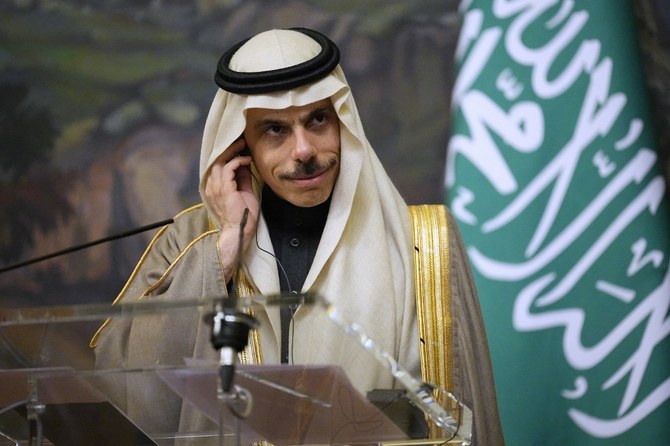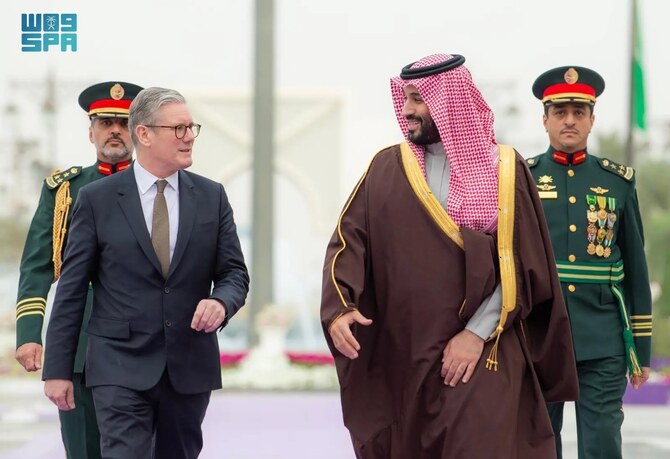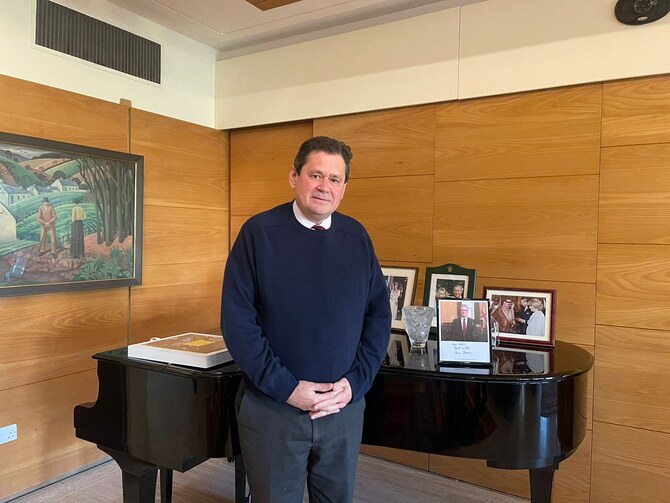Saudi Foreign Minister Prince Faisal bin Farhan bin Abdullah said the Saudi-Iranian agreement to restore diplomatic relations underscores the joint desire by both sides to “resolve disputes through communication and dialogue.”
He added, however: “This does not mean that an agreement has been reached to resolve all pending disputes between them.”
Riyadh and Tehran agreed in Beijing on Friday to reestablish ties that were severed in 2016. They also agreed to reopen their embassies within two months.
In his first interview since the China-sponsored agreement was reached, Prince Faisal said he was looking forward to meeting his Iranian counterpart soon to build on the deal.
“We are preparing to restore our diplomatic ties within two months, so it is normal for us to exchange visits in the future,” he remarked.
On his latest visit to Kyiv and Moscow and talks about a Saudi mediation to stop the Ukraine-Russia war, he stressed that the Kingdom was “prepared to exert efforts and work with the two countries to reach a political solution that ends the crisis and fighting and saves lives.”
Saudi Arabia and Iran agreed to restore diplomatic ties and reopen their embassies within two months. What is Saudi Arabia’s direct interest in such a deal? Will it pave the way for a new phase in the region, on the political and economic levels, and in complicated regional files?
Diplomatic ties are at the core of relations between countries. This is doubly significant for two neighboring countries of the size of Saudi Arabia and Iran. They share several religious, historic and cultural ties.
So, the agreement was reached through China’s sponsorship and mediation and after several rounds of talks over the past two years in Iraq and Oman.
Saudi Arabia is forging ahead in the path of de-escalation it has chosen because of its sense of responsibility in bolstering regional and international security and stability.
Agreeing to restore diplomatic ties does not mean we have reached a solution to all disputes between us. Rather, it is a sign of our joint will to resolve them through communication and dialogue and peaceful and diplomatic means.
We, in the Kingdom, hope to open a new chapter with Iran and bolster cooperation that would consolidate security and stability and push forward development and prosperity, not just in both our countries, but the entire region.
When will you meet with the Iranian foreign minister to activate the agreement and arrange for the exchange of ambassadors? Will we soon see you in Tehran?
I am looking forward to meeting with the Iranian foreign minister soon to build on the agreement. We will prepare to restore diplomatic relations within the next two months. It is natural to exchange visits.
Riyadh and Tehran stressed in their joint statement “non-interference in the affairs of other countries and respect for their sovereignty.” Washington has cast doubt on Iran’s commitment. Does the agreement have any conditions related to meddling in the affairs of others and do you believe Iran will respect this?
One of the most important demands for opening a new chapter in ties with Iran is committing to the agreement signed between us. There is no doubt that both our countries and the region have an interest in activating joint cooperation and coordination and focusing on development instead of hegemony.
Such an approach will achieve the aspirations and hopes of our peoples and generations to come for a better future that is secure, stable and prosperous. We hope the Iranians share our hope and goals and we look forward to working with them to achieve them.
Iran has for some time now been grappling with several crises, such as the collapse of the negotiations over its nuclear program and internal problems that have led to one crisis after another, as well as its struggling economy. Some voices, especially western ones, believe this new agreement may be a lifeline to the Iranian regime. What do you think?
I won’t reply to most of what was brought up in the question because they are mostly related to Iran’s internal affairs. What I can say is that Iran is a neighboring country, whose stability and development will benefit the interest and development of the region. We, in Saudi Arabia, only wish it well.
As for Iran’s continued development of its nuclear capabilities, this, no doubt, is cause for alarm. We have repeatedly called for the Gulf region and Middle East to be free of weapons of mass destruction. We call on Iran to commit to its nuclear pledges and intensify its cooperation with the International Atomic Energy Agency. We will continue to work with allies and friends to ensure that.
China is not in the habit of throwing its diplomatic weight in initiatives aimed at resolving regional crises. The question is: Why was China specifically the mediator, not another country?
As the joint statement said, Saudi Arabia welcomed the initiative proposed by Chinese President Xi Jinping. It worked with it as an extension of the negotiations that it has been holding with the Iranians for two years. It is no secret that China enjoys positive relations with Saudi Arabia and Iran that has helped achieve rapprochement and highlight the Kingdom’s legitimate concerns.
We hope China’s sponsorship of the agreement would bolster coexistence and security in our region, and good neighborliness between countries. The three countries have a joint interest in preparing a regional environment that is marked by peace, security and stability so that they can work on building and developing regional and international partnerships that achieve economic development and prosperity for the people.
You had proposed an initiative in Moscow to end the Ukraine conflict. Can you shed more light on your diplomatic efforts there, specifically how accepting the warring parties were of any Saudi role? Have you made progress in this area and are you optimistic over your success?
We were and are still ready to exert efforts and to work with both countries to reach a political solution that would end the crisis and fighting and save lives.
The efforts of Prince Mohammed bin Salman, Crown Prince and Prime Minister, led to a prisoner exchange between the two sides. The Kingdom has been focusing on meeting the immediate humanitarian needs that emerged from the war. Our humanitarian response in Ukraine is evidence of this drive.
The situation requires both parties, as well as the international community, to stop the dangerous escalation that has harmed the two countries and Europe’s security and weakened international cooperation.
This article was first published on Asharq Al-Awsat.






































